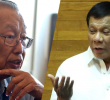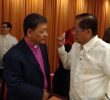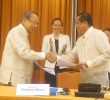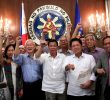
National Democratic Front of the Philippines peace panel chairperson Fidel Agcaoili shakes hands with Philippine government peace panel chairperson Silvestre Bello III during the signing of the ground rules for the conduct of the meetings of the reciprocal working committees on social and economic reforms at the third round of the talks in Rome, Italy on January 2017. (davaotoday.com file photo)
NOORDWIJK AAN ZEE, The Netherlands — Following the announcement of government peace panel chair Silvestre Bello III that the Philippine government will not issue a unilateral ceasefire, the Communist Party of the Philippines did not proceed with the issuance of its interim ceasefire on March 31.
In a statement on March 25, the CPP said it is set to issue a unilateral declaration of interim ceasefire not later than March 31. It said it looks forward to a similar unilateral ceasefire declaration by the GRP as mutually agreed upon during the backchannel talks of both Parties in Utrecht, the Netherlands on March 10 to 11.
The CPP said their issuance of a ceasefire “was supposed to be done reciprocally as agreed upon by the NDFP and GRP in the March 11 statement Joint Statement.”
According to the March 11 Utrecht Joint Statement signed by both Parties, the two panels “agree to forge an interim bilateral ceasefire agreement which shall take effect after the terms of reference and other considerations shall have been settled…the Parties agree to reinstate their respective unilateral ceasefires which shall take effect before the scheduled fourth round of talks in April 2017 as soon as their respective forces shall have been informed.”
But Secretary Bello said they see “no reason” to declare a unilateral ceasefire since the first agenda of the talks which will open tomorrow, Apr. 2 is the issue of the bilateral ceasefire agreement.
“(R)ight now, there is no reason to declare a unilateral ceasefire because our President is more interested in obtaining a bilateral ceasefire agreement,”he said.
Bello said President Rodrigo Duterte has only one marching order for the peace panel.
“Iisa lang ang marching order niya: get me a ceasefire agreement,” he said.
Group fears attacks on civilians
However, farmers’ group, Kilusang Magbubukid ng Pilipinas feared that the non-declaration of ceasefire means the continuation of the “all-out war declaration” against the CPP and the NPA.
KMP Chairperson Joseph Canlas said even civilians and activists are targeted in the all-out war.
“Even with unilateral ceasefires declared in the earlier round of the peace talks, government troops have grossly violated its own ceasefire as it launched intense military operations, encampment in civilian peasant communities,” he said.
Canlas said since July last year “46 farmers, peasant leaders, indigenous peoples and workers were victims of political extrajudicial killings while hundreds of peasant families were forced to evacuate due to AFP’s intense militarization since the declaration of all-out war in February.”
Armed conflicts expected
Bello said armed skirmishes between government troops and the guerrilla fighters are expected given “a state of armed conflict.”
“Unless a unilateral ceasefire is declared by them, we should expect incidents like that to happen even while talks are ongoing,” he said.
The CPP is also anticipating “heightened attacks by the AFP against civilians in light of Duterte’s non-declaration of ceasefire.”
The CPP cited the military operations on March 29, where 100 soldiers allegedly entered Sitio Camansi, Barangay Banglay, Lagonglong town, Misamis Oriental and encamped in the Lumad community.
It said 36 families or 187 individuals were forced to evacuate and seek sanctuary in Cagayan de Oro.
The next day, the CPP said soldiers entered Sitio Traktora, Bagong Silang, Sipocot, Camarines Sur and “without provocation strafed several people who were at the waiting shed, killing resident Renel Mirabeles and severely injuring Joseph Sagario and Regie Loprandado.”
“Another civilian, Erick Madrona, was accosted and later accused of being a member of the NPA. To cover-up the attack against the civilians, military PR officials churned out the fake news that the shooting of the civilians was an encounter with the NPA,” it said.
“Also on March 30, soldiers of the 28th and 66th IB killed Jeffry Santos, a peasant resident of Tagbinonga, Mati City, Davao Oriental, after they encountered the NPA in the area. Santos was on his way to the town center to sell copra when he was waylaid by AFP soldiers. In press releases, the AFP claims he was a member of the NPA, something which his family disputes,” it said.
“Tactical value, strategic value”
But Bello said “the tactical value of the peace process” is to limit the level of violence while the talks are ongoing.
“Habang nag-uusap kayo, the level of violence is naturally expected to go down. Iyon, iyon ang tactical value of the peace process (While we are talking the level of violence is naturally expected to go down. That is the tactical value of the peace process),” he said.
He also said the peace process’ strategic value is to talk about the main reason why there is armed conflict which is poverty.
“Peace in our country will not be obtained by the signing of a final peace agreement. Kahit na sampung libong peace agreement ang pipirmahan natin, hangga’t nandiyan iyong dahilan kung bakit tayo nag-aaway, tuloy pa rin ang kaguluhan (Even if we sign 10,000 peace agreements, while the reason of why we are fighting remains, conflict will continue),” Bello said.
He said the value of talking is for both Parties to discuss the reasons why fighting ensues.
“Ang one of the causes, for example, is extreme poverty. And that will be addressed on the issue of socio-economic reforms, when we talk about genuine land reform; when we talk about social justice; when we talk about national industrialization, maa-address iyong isyu of poverty,” he said.
The CPP also said they fully support the talks even when there is no ceasefire declarations issued by either side.
“The Party looks forward to fruitful discussions and positive steps towards forging an agreement on socio-economic reforms as well as political and constitutional reforms. (davaotoday.com)









